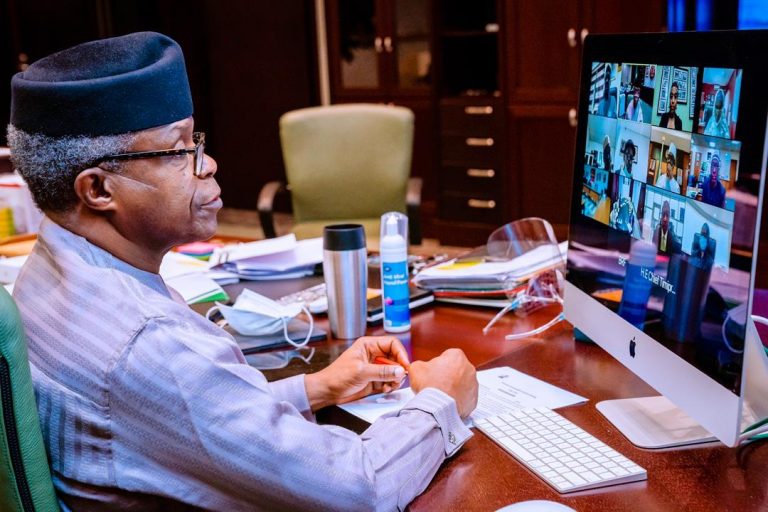Targets Part Of N2.3tr Stimulus Package At Local Produce
Vice President Yemi Osinbajo says based on latest realities, the impact of the economic turmoil occasioned by the ravaging Coronavirus (COVID-19) pandemic may yet be milder than previously anticipated, given the various stimulus packages put in place by the Federal government, in collaboration with the Central Bank of Nigeria (CBN).
Speaking at the virtual edition of the 2020 Presidential Policy Dialogue of the Lagos Chamber of Commerce and Industry (LCCI) on Friday, he said the now anticipated “an economic growth of about -0.59% in 2020.”
This is a significant improvement, compared to the 3.4% forecast for the country by the World Bank, while the African Development Bank (AfDB) in its revised African Economic Outlook says it could be as woeful as between 4.4% and 7.2%. This, it warned, could depend on the responses by governments and development partners to effectively limit the impact of the pandemic, and duration of the global health crisis.
Osinbajo hinged the renewed optimism on the Federal Government’s current efforts at boosting economic recovery by channeling part of its N2.3tr stimulus package, representing about 1.5% of Nigeria’s GDP to purchase locally produced items as buyer of last resort under its Economic Sustainability Plan (ESP).
The package, which he said is not as large the administration had desired, it is the best possible given the “existing fiscal and monetary constraints,” is based on the assumption that the price of crude will average around $30 to $40 per barrel this year,
The government’s decision to act as “buyer of last resort,” the Vice President continued, will “ensure that the whole question of demand, which is weak at the moment, is strengthened by the fact that government stands ready to be the purchaser of last resort, with respect to agriculture or even with respect to our housing programme.”
As part of efforts to support small businesses, the VP said the government, in collaboration with the CBN, is working to help businesses that have obtained bank loans are able to restructure them.
“This is an on-going conversation and we intend to keep the banks reassured that allowing generous restructuring programmes will be supported by the Central Bank and that the Central Bank will not throw them under the bus,” Osinbajo explained further.
While appreciating the premier chamber for the consistency in championing issues and in making valuable contributions to public policy discourse, and desire to promote national development, the Vice President lamented the huge impact of the Coronavirus (COVID-19) pandemic on households or as businesses globally.
The ESP, he explained further, “is intended to boost production, prevent business collapse, and provide liquidity.
“It will also promote the use of labour-intensive methods and direct labour interventions in key areas like agriculture, light manufacturing, housing construction and facility maintenance while increasing infrastructural investment in roads, bridges, solar power, and communications technologies.”
The plan, which covers many economic and social sectors and some of its key provisions, he continued further, is aimed at protecting the poor and vulnerable groups in society, meaning “that we will be strengthening our social investment programmes and the social safety nets that we have created in the past four years.
It includes the Jobs for food segment, which is the “agriculture programme to expand crop cultivation and creates a targeted 5m jobs while guaranteeing uptake by processors, aggregators and the government.”
The jobs through homes which is aimed at job creation jobs and boosting the national housing stock, “using teams of young professionals and artisans in small businesses and building with local products such as cement, gravel, doors, tiles, windows and paint.
“Because of the large number of houses to be built, we will be intentional in encouraging local manufacture of building materials,” adding matter-of-factly that the ESP “is to encourage local production.”
The ESP, Osinbajo noted, is currently working very hard towards encouraging local production of bitumen, following which it would encourage the road construction using concrete.








